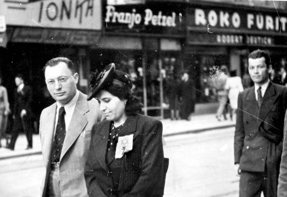VWI goes to ... / VWI invites ...
Der Kolloquienzyklus der VWI-Fellows
Die VWI-Fellows präsentieren Zwischenresultate ihrer Forschungsvorhaben im Rahmen von Kolloquien, die – im kleinen Rahmen angekündigt – auch einer akademisch und inhaltlich interessierten Öffentlichkeit zugänglich sind. Die Vorträge werden durch eine im jeweiligen Thema ausgewiesene Fachperson in Form einer Respondenz oder eines Kommentars begleitet und von den anderen Fellows und dem Publikum diskutiert.
Das Veranstaltungsformat VWI goes to … war ursprünglich aus akutem Raummangel geboren worden, konnte doch das Institut an seinem früheren Standort, am Desider-Friedmann-Platz nicht einmal eine kleine Veranstaltung organisieren. Allein aus dem Kontakt zu anderen akademischen Einrichtungen in Wien, zum Teil auch in der weiteren Region, ergab sich in der Folge – auch dank der jeweils eingeladenen Kommentatorinnen und Kommentatoren – wiederum die einzigartige Möglichkeit, die Fellows und die Forschungen des VWI mit anderen Institutionen, methodischen Ansätzen, Forschungsfragen und Ideen zu vernetzen, das Institut in den regionalen Forschungsraum noch mehr zu integrieren. Aus diesem Grund wurde entschieden, das Format auch am neuen Standort beizubehalten. Gleichzeitig eröffnete sich aber am Rabensteig auch die Gelegenheit, zu diesen Kolloquien Institutionen auch an das VWI einzuladen. Aus diesem Grund trägt ab Herbst 2016 das VWI-Kolloquium entsprechend alternierend auch die Bezeichnung VWI invites... .
| VWI invites/goes to... | |||
| Rory Yeomans: Victims, Beneficiaries, Consumers. Social Mobility, the Holocaust and the Economics of Human Destruction in Croatia, 1941-1942 | |||
Donnerstag, 10. Dezember 2015, 16:00 - 17:30 Institute for Human Sciences 1090 Wien, Spittellauer Lände 3
|
|||
VWI goes to the IWM
Comments by Ljiljana Radonić
Rory Yeomans is currently a Research Fellow at the VWI. He gained his PhD from University College London. He is the author of Visions of Annihilation: the Ustasha Regime and the Cultural Politics of Fascism and editor of The Utopia of Terror: Life and Death in Wartime Croatia. He has been an advanced academia fellow at the Centre for Advanced Study, Bulgaria and a Cantemir fellow at the University of Oxford. His main research interests are the social, economic and cultural history of fascist Croatia.
Ljiljana Radonić is writing her postdoctoral thesis on World War II in Post-Communist Memorial Museums at the Austrian Academy of Sciences. Her PhD on War on Memory. Croatian Politics of the Past between Revisionism and European Standards was published in 2010.
In cooperation with:
|
|||









 What impact did the Holocaust have on everyday life, consumer culture and economic interactions? How did victims as well as ordinary consumers seek to negotiate their existences during the Holocaust? To what extent does genocide generate its own “moral economy”? This presentation seeks to answer these broader questions with reference to the Holocaust and the economic destruction of the Serbs and Jews in the Independent State of Croatia (Nezavisna Država Hrvatska – NDH). In the ten months between April 1941 and February 1942, Croatia under the leadership of the fascist Ustasha movement reshaped the patterns of everyday life and consumption in order to render life for Serbs and Jews unsustainable and construct a racially-purified economy. In the first few months of the state’s existence, Serbs and Jews were removed from the economic life of the nation. In the cities and towns of the new state, the impacts of the purification of economic life were being felt not just by the victims, but also workers, consumers, commissioners of fac-tories and businesses and ordinary citizens in every aspect of everyday life. These changes were exacer-bated by another aspect of economic terror: the attempt to construct an “ethical marketplace” which would be not only racially pure but also free of the harmful practices and economic “pathologies” which had character-ised Serbian and Jewish “control” of the national economy in the 1920s and 1930s. Drawing on the thousands of petitions, letters and diaries written by victims, the internal memos and field reports of low-level and regional bureaucrats charged with implementing the “Aryanisation” of the national economy and the correspondence between ordinary consumers, aspiring beneficiaries and economic agencies, this study aims to build a picture of what it was like to experience terror in real time.
What impact did the Holocaust have on everyday life, consumer culture and economic interactions? How did victims as well as ordinary consumers seek to negotiate their existences during the Holocaust? To what extent does genocide generate its own “moral economy”? This presentation seeks to answer these broader questions with reference to the Holocaust and the economic destruction of the Serbs and Jews in the Independent State of Croatia (Nezavisna Država Hrvatska – NDH). In the ten months between April 1941 and February 1942, Croatia under the leadership of the fascist Ustasha movement reshaped the patterns of everyday life and consumption in order to render life for Serbs and Jews unsustainable and construct a racially-purified economy. In the first few months of the state’s existence, Serbs and Jews were removed from the economic life of the nation. In the cities and towns of the new state, the impacts of the purification of economic life were being felt not just by the victims, but also workers, consumers, commissioners of fac-tories and businesses and ordinary citizens in every aspect of everyday life. These changes were exacer-bated by another aspect of economic terror: the attempt to construct an “ethical marketplace” which would be not only racially pure but also free of the harmful practices and economic “pathologies” which had character-ised Serbian and Jewish “control” of the national economy in the 1920s and 1930s. Drawing on the thousands of petitions, letters and diaries written by victims, the internal memos and field reports of low-level and regional bureaucrats charged with implementing the “Aryanisation” of the national economy and the correspondence between ordinary consumers, aspiring beneficiaries and economic agencies, this study aims to build a picture of what it was like to experience terror in real time.